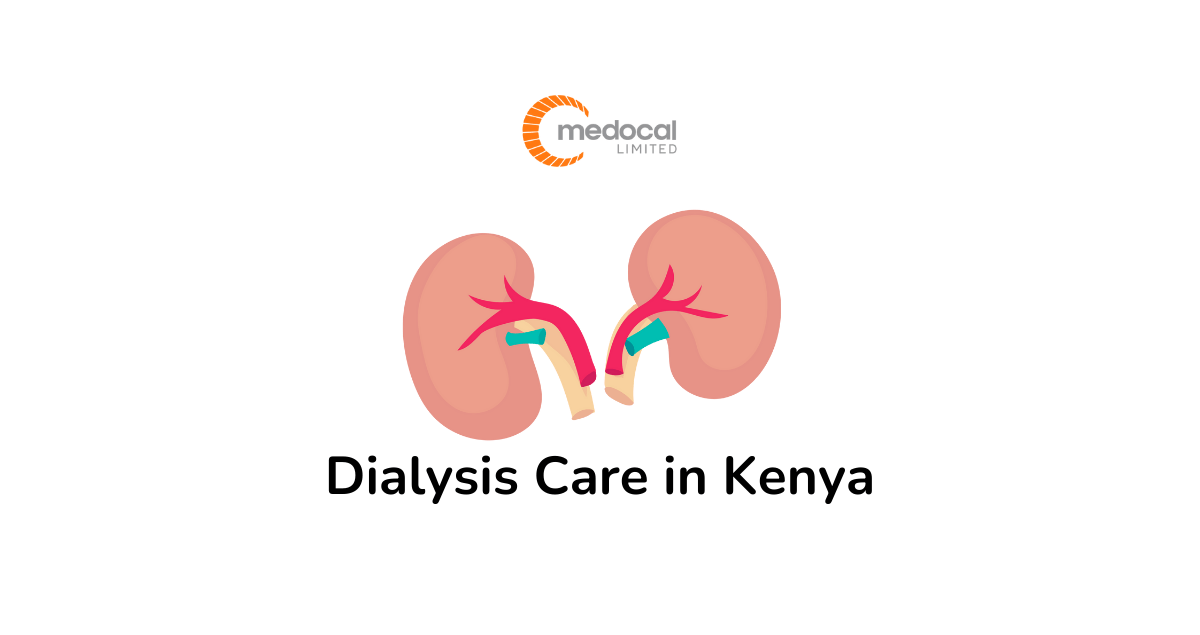
Dialysis is an important treatment for patients with chronic kidney disease (CKD) or sudden kidney failure. This is when the kidneys can’t filter waste from the blood anymore. In Kenya, dialysis is becoming more necessary to help manage kidney problems. This is especially true in cities like Nairobi, Mombasa, and Kisumu, where hospitals have special kidney care units. As a healthcare provider, it is important to understand the dialysis process. Knowing how to help patients during this important treatment can lead to better results. This article gives a clear look at dialysis care. It will talk about the role of regeneration salt and other products used in dialysis. It will also highlight Medocal’s work as a reliable supplier of high-quality dialysis items.
Dialysis is a man-made way to replace what the kidneys do when they can’t filter waste, balance electrolytes, and take out extra fluid from the body. There are two main kinds of dialysis: hemodialysis and pe

ritoneal dialysis. Each type has its own steps and factors to think about.
Hemodialysis is the most used way of dialysis in hospitals in Kenya. In this process, a machine called a dialyzer filters the blood outside the body. It removes waste, extra fluids, and helps balance electrolytes like potassium and sodium. The blood is taken from the patient, filtered through the dialyzer, and then returned to the body.
Peritoneal dialysis (PD) uses the lining inside the stomach area as a natural filter. A liquid called dialysate is put into the stomach through a tube. Waste products are then taken out from the body using this method. This type of dialysis can be done at home if the right setup is there. However, in Kenya, it is not very common in medical centers because it needs special training.
Dialysis treatment can be hard on patients, both physically and mentally. Good management during dialysis can help patients recover better and reduce problems that may come up. Here are important things to remember for dialysis care:
During dialysis, it is very important to keep an eye on the patient’s vital signs. You need to check blood pressure, heart rate, breathing rate, and temperature. This helps to find any problems early.
Fluid overload is a big worry for patients with kidney failure. Dialysis helps to take out extra fluid from the body, but managing fluid well between sessions is very important. Patients need to follow strict limits on how much fluid they can drink. These limits can change depending on the type of dialysis, how well the patient’s kidneys are working, and how much fluid is taken out during each session.
The access site, whether it is an AV fistula, graft, or catheter, needs proper care. This helps to prevent infection and keep it working well. You should clean it regularly, change the dressing, and check for signs of infection, like redness, swelling, or discharge. This should be part of your normal care routine.
Dialysis can feel hard, especially at the start. Your body needs time to get used to the treatment. It’s important to handle any pain you feel, whether it comes from needle insertion or cramps during dialysis. You may need pain relievers to help with the pain. Also, changing the fluid removal rates can often help ease muscle cramps.
The mental and emotional impact of dialysis is important to note. Patients who go through long-term dialysis might feel anxious, sad, or alone. Offering help through counseling or support groups can make life better for these patients.
To give the best dialysis treatment, using the right supplies and tools is very important. Medocal is a reliable supplier of medical products in Kenya. They offer high-quality dialysis supplies like regeneration salt, dialysate, and more.
Regeneration salt is an important part of the dialysis process, especially in hemodialysis. This salt helps clean and refresh the filter in the dialyzer. This keeps the machine running well. Medocal is known for providing high-quality regeneration salts. These salts help keep dialysis equipment working effectively and for a long time.
The dialysate is the fluid used to take out waste and extra fluid from a patient’s blood. It is important to keep an eye on the mix of the dialysate. This includes the levels of electrolytes, buffers, and other parts. Keeping track helps avoid problems like imbalances. Medocal gives hospitals and clinics high-quality dialysate solutions. These solutions are made to help with good dialysis treatment.
Medocal offers many dialysis access devices. This includes high-quality catheters and needles for hemodialysis and peritoneal dialysis. These products are made to reduce problems like infection. They give safe and dependable access for dialysis procedures.
As Kenya’s top supplier of medical equipment and supplies, Medocal is dedicated to offering the best dialysis products to healthcare facilities throughout the country. Known for quality and dependability, Medocal is the trusted partner for hospitals and clinics in Nairobi, Mombasa, Kisumu, and other areas.
Medocal has a wide range of dialysis supplies. This includes regeneration salt, dialysis catheters, and needles. By using these good products, doctors can make sure that their dialysis procedures are safe and work well.
Medocal knows how important it is to deliver medical supplies on time. With a strong logistics system, Medocal makes sure that hospitals in Kenya get their dialysis supplies quickly. This helps keep patient care running smoothly.
Medocal cares about quality and keeping customers happy. This makes Medocal a trusted partner in healthcare. Hospitals and clinics can count on Medocal for regular supply, technical help, and knowledge about products.
Dialysis is a vital treatment for people with kidney failure, but it needs careful management and good supplies. Doctors in Kenya should know the dialysis process to keep patients safe and healthy. By working with Medocal, hospitals and clinics can get the best dialysis products, like regeneration salt and other key supplies. This helps them provide great care for all patients.
WhatsApp us
Drop us your email & phone no and we will share our products catalogue.
